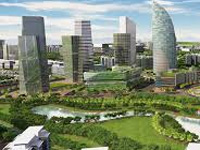PM's remarks at the launch of AMRUT, Smart Cities Mission and Housing for All (Urban)

The Prime Minister, Shri Narendra Modi, today said that for the first time in the country, the people, and the urban leadership would play the pivotal role in deciding the future course of their cities. He was speaking at the launch of three major urban development initiatives: AMRUT (Atal Mission for Rejuvenation and Urban Transformation); Smart Cities Mission; and Housing for All (Urban), at Vigyan Bhawan in New Delhi.
The Prime Minister explained that for the first time in India, a challenge was being floated, in which the citizens of urban India could contribute in the formulation of development visions of their cities. Those cities which were able to competitively meet the required parameters would be developed as smart cities. Hence, the Prime Minister said, this competitive mechanism would end the top-down approach, and lead to people-centric urban development.
The Prime Minister said these urban development schemes were not prepared by the Government alone, but involved perhaps the biggest consultation exercise ever taken by the Union Government, involving all stakeholders and examining global best practices. The Prime Minister gave a simple vision of a smart city, as one which was a step or two ahead of people's aspirations. Technology, transportation, energy efficiency, walk-to-work, cycling etc were some elements mentioned by the Prime Minister. The Prime Minister said the Government is sensitive to consumer protection, and towards ending undue harassment, especially with regard to housing. He said one Bill towards this end has already been introduced in Parliament.
Stating that public representatives and leaders are remembered by the good work they did in their terms, the Prime Minister urged urban leaders to contribute to doing something for the good of the people. He said the people assembled in Vigyan Bhawan today, had on them the collective responsibility for better quality of life for 40 percent of India's population that either lived in cities, or were dependent on cities for their livelihood. He said the aspirations of migrants from rural areas, and slum dwellers, have to be balanced with the changing global environment. He said ensuring a good life for them is our responsibility. In this context, this 2-day workshop presented a good opportunity to work out strategies for the future.
Recalling the Emergency, which was imposed 40 years ago on this day, the Prime Minister said the dreams and aspirations that inspired people to struggle against the emergency, should be a beacon for this gathering. He said all schemes for urban development should move forward based on people's participation.
The Prime Minister said that urbanization should be viewed as an opportunity, and urban centres should be viewed as growth engines. He said if this had been done 25-30 years ago, it would have led to good results today, but better late than never. He said schemes which had a clear vision and were people-centric, were the need of the hour. He called for replication of best practices from across the country. In particular, the Prime Minister mentioned Hyderabad's tax collection system, Karnataka's efforts for solid waste management, and Chhattisgarh's work to eliminate open defecation.
Mentioning the challenge of rising population, he said all possible avenues should be explored to find the resources for urban development.
The Prime Minister said a House was a turning point in the lives of poor, which led towards a better life. He said the Government's effort was to not just provide a house, but to provide the right environment to live life to the fullest.
Citing the existing housing shortage of 2 crore units, the Prime Minister said that India was completing 75 years of independence in 2022, and by then, it was our responsibility to provide a house for everyone.
The Prime Minister said today there is a lack of holistic vision about urban planning, and expansion is driven not by the administrators of a city, but by property developers. Through AMRUT, the aim of the Government is to give cities themselves the chance to plan their future growth.
The Prime Minister appreciated people for their interest and work in the Swachh Bharat initiative, as well as the positive role played by media in generating awareness.
The Prime Minister said urban and rural development in our country should be complimentary. One way of doing this was to ensure waste water management in urban areas, so that the treated water could be returned to rural areas for irrigation. Similarly solid waste management could generate compost which could act as organic fertiliser for the surrounding rural areas.
The Prime Minister released logos, and taglines for AMRUT and Smart Cities Mission; and guidelines for AMRUT, Smart Cities Mission and Housing for All (Urban). The Prime Minister also visited an exhibition on best practices in urban development.
The Minister for Urban Development Shri Venkaiah Naidu, and the Minister of State for Urban Development Shri Babul Supriyo, the Chief Minister of Maharashtra Shri Devendra Fadnavis, the Chief Minister of Haryana Shri Manohar Lal Khattar, and the Deputy Chief Minister of Jammu and Kashmir, Shri Nirmal Kumar Singh were present on the occasion.







